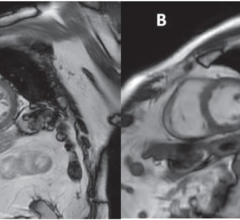
September 10, 2010 – The U.S. Food and Drug Administration (FDA) is requiring that gadolinium-based contrast agents (GBCAs) carry new warnings on their labels about the risk of a rare and potentially fatal condition known as nephrogenic systemic fibrosis (NSF). The condition may occur if the drug is administered to certain patients with kidney disease.
Three of the GBCAs – Magnevist (marketed by Bayer Healthcare), Omniscan (GE Healthcare) and Optimark (Covidien) – will be described as inappropriate for use among patients with acute kidney injury or chronic severe kidney disease. All GBCA labels will emphasize the need to screen patients to detect these types of kidney dysfunction before administration.
GBCAs are intravenous drugs approved by the FDA for use with magnetic resonance imaging (MRI) or magnetic resonance angiography (MRA) to help detect abnormalities of organs, blood vessels and other tissues.
NSF involves the formation of excess fibrous connective tissue in the skin, joints, eyes, and internal organs. Symptoms of NSF can include scaling, hardening and tightening of the skin, red or dark patches on the skin and stiffness. NSF may lead to death, especially if it involves body organs.
The FDA’s review of the safety of the most widely used GBCAs determined that Magnevist, Omniscan, and Optimark are associated with a greater risk than other GBCAs for NSF in certain patients with kidney disease. Data suggest that NSF may follow the administration of any GBCA and the FDA continues to assess the safety of each GBCA to better estimate its NSF risks.
“The FDA is requiring these labeling changes to enhance the safe use of gadolinium-based contrast agents, including avoidance of certain agents among patients at highest risk for nephrogenic systemic fibrosis,” said Rafel (Dwaine) Rieves, M.D., director of the division of medical imaging products in the FDA’s Center for Drug Evaluation and Research.
Steps Physicians Should Take
To further enhance the safe use of the imaging agents, the FDA recommends that healthcare professionals:
• Estimate kidney function through laboratory testing for patients at risk for chronically reduced kidney function?
• Avoid use of GBCAs in patients suspected or known to have impaired drug elimination unless the imaging is essential and not available without contrast?
• Monitor for signs and symptoms of NSF if a GBCA is administered to a patient with acute kidney injury or chronic, severe kidney disease?
• Administer a GBCA only once during an imaging session
Lantheus Medical Imaging's gadolinium-based MRA contrast agent Ablavar (gadofosveset trisodium) was not specifically mentioned in the FDA warning. To date, there have been no reported incidents of NSF with the agent. However, Lantheus said the revised language provides clearer guidance to healthcare professionals about the risk of gadolinium-based contrast agent-associated NSF in patients who are renally impaired.
No substantial changes will be required by the FDA to the Ablavar prescribing information. The agent is a low dose injectable blood pool imaging agent for use to evaluate aortoiliac occlusive disease (AIOD) in adults with known or suspected peripheral vascular disease (PVD). It is the first imaging agent with a specific FDA-approved indication for use with MRA. To date, there have been no reported incidents of NSF with Ablavar.


 April 18, 2024
April 18, 2024 








